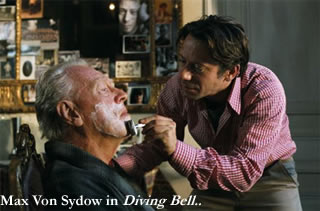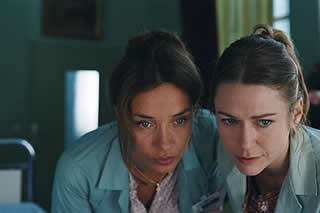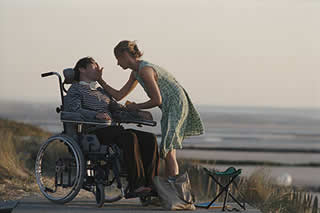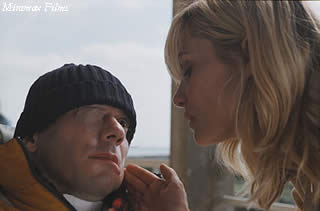Some weeks ago, way back in 2007, I said I’d deliver the second part of my column on the folks behind the extraordinary The Diving Bell and the Butterfly, which since has snagged two Golden Globes (best foreign language film, best direction). Alas, that story seemed to have fallen down a mystery rabbit hole located somewhere in the nether regions of my computer desktop. I’m now happy to report that I have dived down after it (sans diving bell, thankfully) and have retrieved the orphaned item. Apologies for the late rescue.
It’s nice when filmmaking runs in the family. Somewhere in the middle of our round-robbin interviews for The Diving Bell, a tall, lanky cameraman entered the room a few minutes before Max von Sydow, who plays Jean-Do’s aging father in the movie. It was von Sydow’s son Claus, who ducked in and out just long enough to nab some shots for a documentary on his father’s life, but said not a peep about the project. (Coincidentally, Claus happens to have been in my same graduating class at Harvard, but the memory escaped me before Claus himself escaped out the door.)
graduating class at Harvard, but the memory escaped me before Claus himself escaped out the door.)
And while von Sydow pere waxed eloquent about his role in The Diving Bell, he was as mum as his son about his role in this biographical film. “I just can’t talk about it,” he smiled.
Claus’s appearance reminded me that it is the presence of fathers in The Diving Bell – in von Sydow’s character onscreen and in Schnabel’s own father offscreen, who died just before the movie was made – that speaks volumes about why the movie is so powerful and transporting.
Von Sydow has only two brief scenes, but the emotional pull of one of them, when he hears of the death of his son on the telephone, lives in my memory months later. Shot in one take, it’s one of the most affecting scenes Sydow has performed on camera.
 “I had an elderly father – he was 60 when I was 10,” the actor noted. “So I think I know something about that relationship.”
“I had an elderly father – he was 60 when I was 10,” the actor noted. “So I think I know something about that relationship.”
At the risk of sounding morbid, I asked von Sydow whether, as a man who once played chess against Death in Bergman’s The Seventh Seal, he related his character in the film to growing older in his own life and approaching that “final curtain”?
“Yes, of course,” he mused. “I think the older you get the more you think of the end also. And you realize what it might mean, et cetera.”
And what did it mean to him?
“Well, then end – it depends on where it comes. The end can come too early….and it may even be welcomed. It all depends on the rest of your life and whatever you do with it.” He paused, as if to rescue himself from revealing too much. “But I think this is a very positive film. It’s not about death or being caught in a straight jacket. It’s about one thing – overcoming the difficulties in your life. And about this hero who does it so superbly.”
Schnabel hardly shares the elegant Scandinavian reserve of Von Sydow, and he tells the story of his own father and the making of The Diving Bell as viscerally as any of the scenes in his movie. The moment of his father’s death, and the son’s intimate experiencing of that moment, was a gateway for Schnabel to help discover the purpose and the meaning of his movie. It is worth quoting here.
any of the scenes in his movie. The moment of his father’s death, and the son’s intimate experiencing of that moment, was a gateway for Schnabel to help discover the purpose and the meaning of his movie. It is worth quoting here.
“The scri pt arrived while my father was sick,” Schabel remembered. “The night before he died I put him in the bathtub and I kind of wrapped him up, and the next morning I called Darren (the helper) who was up there and asked how is he? And he said he’d had a rough night…About five minutes later he said, ‘you should come up here right now.’ And I ran upstairs and my father had bile coming out of his mouth and his eyes were flickering and I didn’t know if he had any air left in his brain and I just said – Dad! I thought maybe he couldn’t see me, though we were very close together.
“So what I tried to show in my movie was what my father was seeing when he was dying, not what I was seeing when I was looking at him. And the fear of death that he had — if someone had a tool to look into his interior life, to find peace in that, to feel he could  accept the transition – but he just wasn’t prepared in any way. I think Jean Dominique Baudy was definitely prepared, because he was in some place between life and death, and he was reporting back from that place. And that I think became very comforting for him.”
accept the transition – but he just wasn’t prepared in any way. I think Jean Dominique Baudy was definitely prepared, because he was in some place between life and death, and he was reporting back from that place. And that I think became very comforting for him.”
Jean-Do lost his self-pity because he found he had work to do – to write his book, The Diving Bell and the Butterfly. In the year and a half of his hospitalization, he got the chance to relive his life, and stayed alive long enough to finish his book. He died ten days after it was published.
In telling Baudy’s story from a vantage point informed by his own father’s death, Schnabel told us he had, in essence, found his own “self-help device” that would guide him in handling the ultimate journey of his own death. As revelations about the making of great films go, it doesn’t get more intimate, or memorable, than this. [END]

